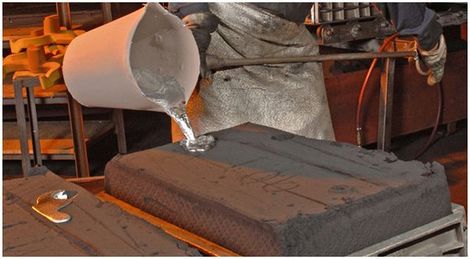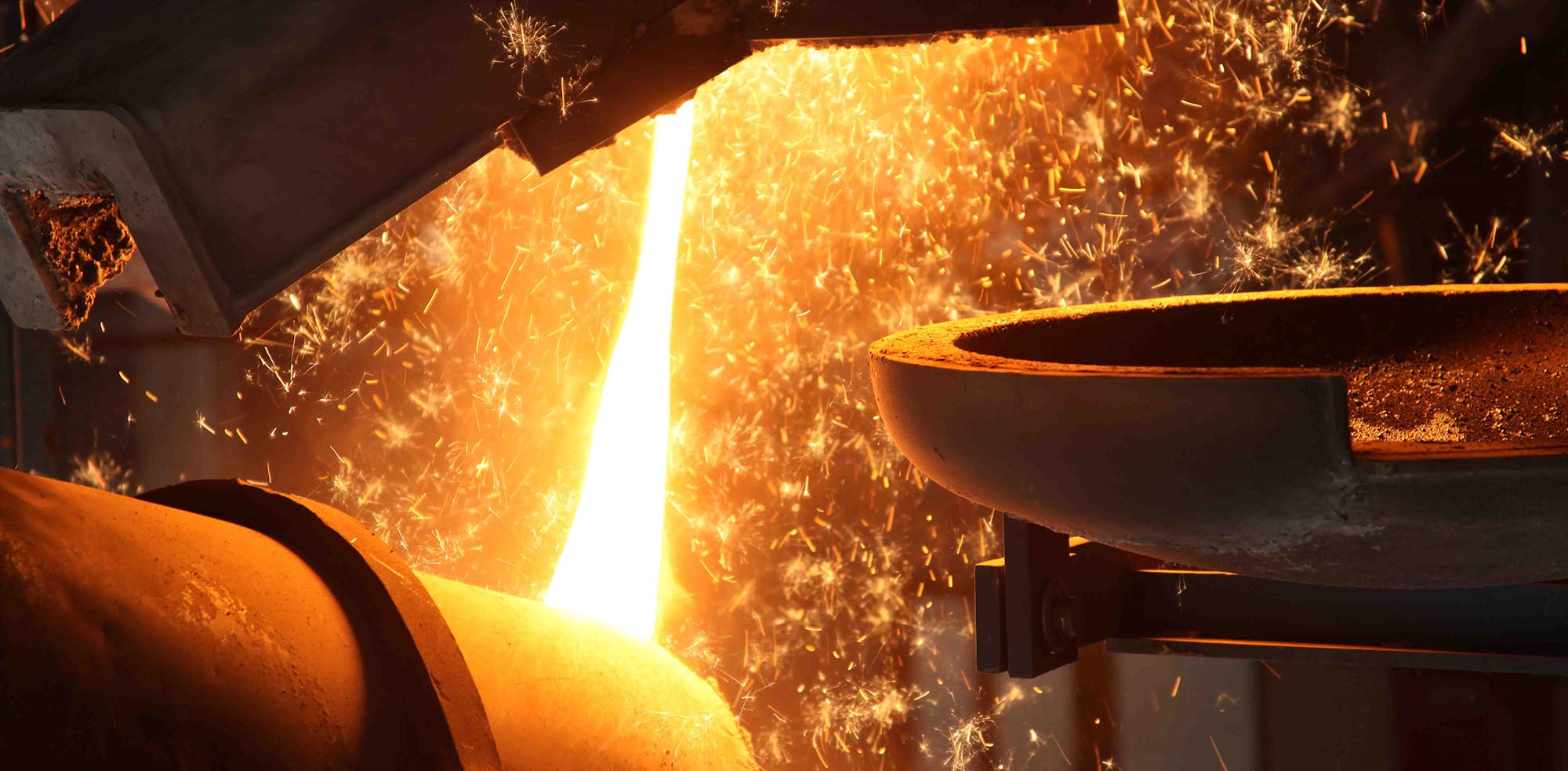Just How a Metal Foundry Contributes to Lasting Metal Production Practices
Metal foundries play a vital role in advertising sustainability within the metal production industry. By including recycled products, they minimize reliance on virgin sources and decrease ecological influences. Energy-efficient melting procedures further minimize energy usage and discharges. The trip toward lasting practices entails even more than just recycling and power administration. It encompasses a wider commitment to ethical sourcing and innovative innovations. The implications of these methods are considerable and warrant more detailed assessment.
The Duty of Recycling in Metal Foundries
While metal manufacturing has traditionally relied upon virgin materials, the boosting focus on sustainability has actually brought about a substantial change in practices, especially in metal foundries. Recycling has actually arised as a necessary part of this improvement, allowing foundries to repurpose scrap metal and reduce dependence on mined resources. By incorporating recycled products into their processes, foundries not just decrease ecological influence but likewise reduced manufacturing costs.
Making use of recycled metals, such as copper, aluminum, and steel, reduces energy usage and minimizes greenhouse gas exhausts connected with typical mining and refining methods. Additionally, foundries can accomplish top quality outcomes by utilizing sophisticated sorting and handling technologies to ensure the pureness of recycled products. This emphasis on recycling fosters a circular economic situation, where waste is decreased, and resources are made use of successfully. Consequently, metal foundries play an essential function in advertising lasting techniques within the metal manufacturing industry.
Energy-Efficient Melting Methods
Energy-efficient melting strategies are necessary for boosting sustainability in metal manufacturing. These strategies considerably reduce power usage during the melting process, which is among one of the most energy-intensive stages in metal manufacturing. Technologies such as induction melting, resistance heating, and microwave melting offer enhanced effectiveness compared to traditional approaches. Induction melting, as an example, utilizes electromagnetic fields to create warmth directly within the metal, lessening energy loss and offering exact temperature level control.
Furthermore, implementing warm recovery systems can better boost efficiency by catching and reusing waste warmth generated during melting. Using sophisticated insulation materials and optimizing heating system layouts additionally contribute to power savings. By embracing these ingenious melting methods, metal foundries can reduce their carbon footprint, reduce functional expenses, and add to an extra sustainable production landscape. The assimilation of energy-efficient practices not only straightens with ecological objectives yet also satisfies the expanding demand for responsible production techniques in the metal market.
Sustainable Sourcing of Raw Materials
Lasting sourcing of resources is vital for minimizing the ecological impact of metal production. This involves the enhanced utilization of recycled steels, the adoption of honest mining techniques, and campaigns aimed at neighborhood sourcing. By prioritizing these methods, the market can advertise accountable source administration and assistance regional economic climates.

Recycled Metal Application
Exactly how can markets efficiently decrease their environmental effect while satisfying the expanding need for metal? One significant approach is the utilization of recycled metal. By integrating scrap metal into their production procedures, foundries can reduce the extraction of virgin materials, consequently decreasing and saving all-natural resources power intake. Recycled steels call for much less power to process compared to their raw equivalents, bring about reduced greenhouse gas emissions. Additionally, the use of recycled metal helps divert waste from landfills, promoting a circular economy. Industries that prioritize recycled metal not only add to sustainability but likewise advantage from price savings related to decreased product procurement. Recycled metal application stands as a vital technique for eco liable metal manufacturing.
Ethical Mining Practices
While the need for steels remains to climb, industries are increasingly identifying the relevance of moral mining methods in ensuring liable sourcing of raw products. Ethical mining incorporates a commitment to environmental stewardship, social duty, and adherence to reasonable labor methods. Firms are currently focusing on partnerships with mines that demonstrate openness in their operations, lessening environmental effect and valuing local areas. This approach not just promotes a lasting supply chain but additionally boosts the track record of services involved. By carrying out extensive criteria and certifications, industries can fight prohibited mining tasks and promote the well-being of employees. Eventually, honest mining practices contribute considerably to a more sustainable metal production community, aligning economic growth with social and ecological integrity.
Local Sourcing Campaigns

Technologies in Metal Casting Processes
Developments in metal casting processes are changing the market by including innovative recycling strategies that lessen waste. Energy-efficient melting techniques are also being developed to reduce power usage during production. In addition, making use of ingenious mold materials contributes to boosted efficiency and sustainability in casting operations.
Advanced Recycling Techniques
Advanced recycling techniques are transforming metal casting processes, significantly enhancing sustainability in the market. These developments concentrate on recycling and recovering scrap metal, considerably reducing waste and the requirement for virgin materials. Techniques such as hydrometallurgy and pyrometallurgy enable foundries to draw out important steels from utilized components, making sure reliable resource application. In addition, advanced sorting and filtration innovations improve the high quality of recycled steels, making them appropriate for high-performance applications. This not just reduces the ecological footprint of metal manufacturing however additionally promotes a round economic climate by advertising the reuse of materials. As these reusing approaches proceed to progress, they promise to further streamline operations within foundries and add to an extra lasting metal manufacturing landscape.
Energy-Efficient Melting Approaches
While typical melting techniques have actually long been the foundation of metal casting, recent advancements have presented energy-efficient techniques that considerably decrease energy intake and emissions. Technologies such as induction melting and electric arc heaters have actually gotten prominence, permitting accurate control over temperature level and minimizing the requirement for fossil fuels. These approaches not only boost energy efficiency yet also advertise much faster melting times, which equates to decrease operational costs. Furthermore, advancements in warm healing systems allow foundries to catch and recycle excess warm produced throughout the melting procedure. This all natural strategy to energy monitoring not just sustains lasting methods but also placements metal foundries as leaders in the change in the direction of greener production procedures, even more aligning with international sustainability objectives.
Innovative Mold Products
As the demand for even more effective and sustainable metal casting procedures expands, the expedition of ingenious mold products has actually ended up being company website a focal point in the industry. Typical mold materials commonly contribute to ecological obstacles, prompting the search for choices that lower waste and power consumption. Recent improvements include the advancement of naturally degradable binders and recyclable compounds, which not only enhance mold and mildew efficiency but likewise reduce eco-friendly impact. In addition, making use of 3D printing technology in mold creation permits intricate layouts that decrease material usage and allow fast prototyping. These cutting-edge products not only enhance casting accuracy yet additionally align with sustainability goals, showcasing the sector's dedication to reducing its carbon impact while keeping top notch production requirements.
Decreasing Waste Via Advanced Modern Technology
Cutting-edge innovations are changing the metal production sector by substantially reducing waste and boosting effectiveness. Advanced information analytics and equipment discovering formulas enable foundries to enhance manufacturing processes, recognizing inefficiencies and lessening scrap product. Smart sensors keep track of equipment efficiency in real-time, enabling predictive maintenance that reduces downtime and waste generation. Furthermore, additive manufacturing techniques, such as 3D printing, permit the production of complicated components with very little product use, significantly reducing waste compared to typical techniques.
Closed-loop systems are coming to be more common, where scrap metal and results are reused back into the manufacturing cycle, guaranteeing that products are used to their max potential. This assimilation of modern technology not just advertises source conservation however also improves the total sustainability of metal production techniques. By embracing these innovations, foundries can add to an extra sustainable future while maintaining competitiveness out there
The Effect of Foundries on Carbon Impact Decrease
Foundries play a vital role in reducing the carbon footprint of the metal manufacturing industry by executing numerous sustainable methods. By using energy-efficient modern technologies, such as electric arc heaters, these centers substantially reduced greenhouse gas discharges compared to traditional methods. In addition, foundries progressively take on eco-friendly energy sources, which likewise reduces their dependence on fossil gas.
Reusing scrap metal is another essential method that foundries employ, conserving resources and reducing the requirement for virgin products. This not just reduces waste yet also minimizes the energy-intensive extraction procedures related to mining. The adoption of closed-loop water systems assists to decrease water use and decrease wastewater discharge, contributing to an extra sustainable procedure.
Through these campaigns, foundries demonstrate their dedication to ecological stewardship, leading to a significant decrease in the general carbon impact of the metal production market. Their recurring efforts are crucial in the change toward an extra lasting industrial landscape.
Regularly Asked Concerns
What Types of Metals Are The Majority Of Generally Recycled in Foundries?
Light weight aluminum, steel, copper, and brass are among the most commonly recycled steels in foundries. These metals are preferred as a result of their high recycling prices, financial worth, and extensive availability, contributing considerably to commercial sustainability why not find out more initiatives.
Exactly How Do Foundries Make Sure the Quality of Recycled Products?
Foundries determine the high quality of recycled products via strenuous testing, arranging, and filtration procedures. They apply sophisticated innovations to evaluate structure and remove contaminations, assuring that the recycled steels fulfill sector requirements for efficiency and safety.
What Certifications Exist for Sustainable Foundry Practices?
Different certifications exist for lasting foundry methods, including ISO 14001 for environmental monitoring, ISO 50001 for power monitoring, and LEED accreditation for lasting structure techniques (Metal Foundry). These accreditations aid guarantee adherence to environmental and sustainability standards in procedures
Just How Do Foundries Determine Their Carbon Footprint Decrease?
Foundries measure carbon footprint reduction with tools like lifecycle assessments, energy audits, and emissions tracking systems. They contrast standard discharges to present results, examining renovations in power effectiveness, product use, and renewable resource adoption with time.
What Are the Economic Advantages of Lasting Metal Production?
Lasting metal production offers financial advantages such as decreased operational costs, enhanced performance, improved market competition, and potential government incentives. In addition, it fosters innovation and draws in ecologically mindful consumers, eventually driving long-lasting productivity for businesses.
Metal foundries play an important function in advertising sustainability within the metal manufacturing industry. While metal production has actually traditionally relied on virgin products, the raising focus on sustainability has actually led to a significant change in techniques, particularly in metal foundries. By incorporating scrap metal into their manufacturing procedures, foundries can reduce the extraction of virgin materials, thus saving natural resources and decreasing power usage. Foundries play a crucial function in reducing the carbon footprint of the metal straight from the source manufacturing industry by carrying out numerous lasting techniques. Reusing scrap metal is an additional essential method that foundries utilize, preserving resources and decreasing the demand for virgin products.